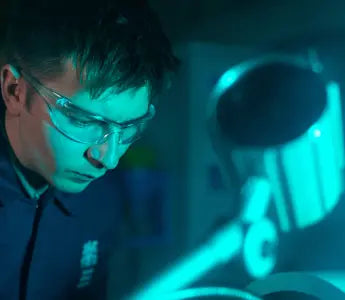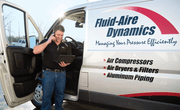If your industrial air compressor is just humming and not starting, there are generally two places to look: the motor or the compressor (air end). Alternatively, it is possible that the problem lies in the power supply. The trick to troubleshooting air compressor startup issues lies in figuring out which kind of problem you have. Read on to learn why an air compressor hums, and what to do about it.
Motor-Related Problems Causing Air Compressor Humming

If you hear your air compressor humming, the motor is often the culprit. A motor problem may be a mechanical issue or an electrical problem within the motor. If the air compressor motor is damaged or worn out, it may struggle to start, which can cause the air compressor to just hum. Overheating, wear and tear, or internal faults can all lead to motor issues. There are several possible problems that can arise with the air compressor motor that could cause it to hum. These are some of the most common.
Problems with Compressor Motor Capacitors
The most common cause of electric motors not starting is a failed start capacitor; this is a device that stores energy to give the motor an extra boost during air compressor startup. If the capacitor fails or is failing, it won’t provide this initial power, causing the motor to hum but not actually start.
Overload Protection Activated
If the air compressor motor has been overworked or overheated, the thermal overload protection may have been activated. This safety feature prevents the motor from running when it’s too hot, which can cause it to hum but not start until it has cooled down.
Motor Windings Damaged
The windings are coils of wire inside electric motors that generate a magnetic field to create motion. If these windings are damaged or shorted out, it can lead to the motor humming and not starting.
Locked or Seized Bearings
Bearings allow the air compressor motor’s rotor to spin freely. If these bearings seize or lock up due to lack of lubrication or wear and tear, the rotor cannot move even when power is supplied, causing a humming noise.
Damaged Motor Shaft
A motor shaft that is bent, cracked, misaligned or otherwise damaged can create resistance and prevent the motor from starting, resulting in the air compressor humming.
Problems with the Compressor or Air End

Issues in the compressor or the air end can also cause a humming sound but prevent the air compressor from starting. While some problems are common to all compressor types, others may be specific to certain types of air compressors (e.g., reciprocating or rotary screw).
Pressure Issues
If there’s excess pressure in the air end of the compressor, it might be hard for the motor to start. This might be due to a faulty pressure switch, which should cut off the motor once a certain pressure is reached. It could also be caused by an air compressor unloader valve malfunction; this is the valve that is supposed to release excess pressure when the compressor stops.
Check Valve Failure
The tank check valve allows air to flow in one direction only, from the pump to the tank. If the check valve is stuck or not functioning properly, air can flow back toward the pump, causing tank pressure to build up. This could make the electric motor work harder upon startup and lead to a humming sound.
Blocked Intake Filter
The air filter’s job is to keep dust and debris out of the compressor. If the filter becomes clogged or blocked, it restricts the airflow into the air compressor. This can increase the load on the motor, causing air compressor humming.
Lubrication Issues
Lack of adequate lubrication in the air end can increase friction and heat, making it difficult for the components to move freely. This could strain the motor and cause the air compressor to hum instead of starting up.
Misalignment or Wear of the Screw Elements
In rotary screw compressors, the precise alignment and condition of the screw elements are critical for proper operation. Misalignment, wear, or damage to these elements can increase the resistance against the motor when it tries to start, resulting in a humming noise.
Broken Pistons
In a reciprocating air compressor, a broken or worn piston or crankshaft can result in the compressor humming without starting. If the crankshaft is not able to drive the pistons, the compressor hums and will not be able to make air.
Excessive System Load
If downstream equipment (like air dryers, filters, or pneumatic tools) presents too much resistance or demand, the compressor can struggle to start, leading to the air compressor just humming but not starting.
Problems with the Air Compressor Power Supply

The air compressor requires a steady supply of electricity at the proper voltage for the electric motor to start and operate correctly. If the air compressor does not have enough amperage, or the electrical supply is not steady, the compressor motor won't start. Several electrical issues could cause air compressor humming.
Under-Voltage or Over-Voltage
If the voltage supplied to the motor is lower or higher than what’s required, the motor might hum but not start. Under-voltage doesn’t provide enough amperage to the air compressor motor, and over-voltage could cause overheating or damage to the motor windings.
Phase Loss or Imbalance
In a three-phase power supply, if one of the phases is lost (due to a blown fuse, for example), it’s known as phase loss. Similarly, if there’s a large difference in voltage between the phases, it’s called phase imbalance. Both can prevent the motor from starting while causing a humming sound.
Faulty Wiring
Loose connections, damaged wires, or incorrect wiring can lead to an unstable electrical supply. If the motor doesn’t receive the proper voltage, it might hum without starting up.
Inadequate Circuit Capacity
If the circuit doesn’t have the capacity to handle the electrical load of the air compressor, it can lead to a drop in voltage. The compressor motor might try to start, resulting in a humming sound, but fail due to the insufficient power.
Faulty Start Switch or Contactor
If the start switch or contactor (which controls the flow of electricity to the motor) is malfunctioning, the motor might receive a low voltage. This can cause it to hum but not start.
Fixing a Humming Air Compressor
An air compressor that just hums but will not start and is not making air indicates a problem somewhere along the line. Continuing to try to operate the compressor while it is humming could lead to overheating or damage to parts such as the motor windings or bearings.
If your compressor hums but does not start and does not make air, first turn off the compressor. Then, disconnect it from the power source for safety before attempting any further diagnostics. Look for any obvious problems with the power supply, motor or the compressor itself.
For an industrial air compressor, unless the problem is very obvious, it is usually best to call a professional to diagnose the cause of a humming noise. They can properly diagnose the problem and perform necessary repairs or replace faulty parts to get your air compressor running smoothly again and ensure that you have a consistent supply of compressed air.
Humming Air Compressor?

Air compressor humming is not a problem that should be ignored. Troubleshooting and repairing an air compressor that is humming and not starting can be complex and can involve potential risks if not done correctly. Fluid-Aire Dynamics can help you get to the root of the problem and get your compressor back up and running quickly. Contact our expert repair team for 24/7 emergency air compressor repair service in our service areas.




